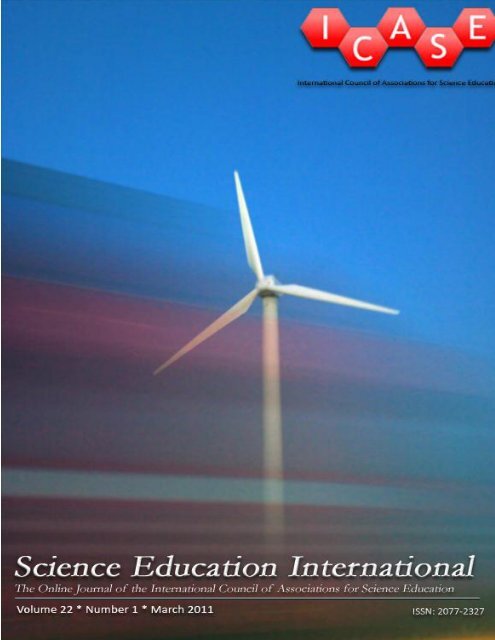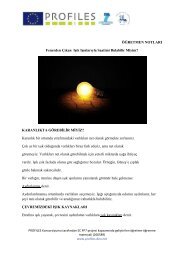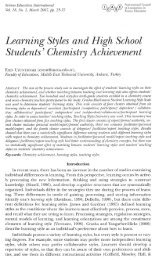PDF Size - International Council of Associations for Science Education
PDF Size - International Council of Associations for Science Education
PDF Size - International Council of Associations for Science Education
Create successful ePaper yourself
Turn your PDF publications into a flip-book with our unique Google optimized e-Paper software.
SCIENCE<br />
EDUCATION<br />
INTERNATIONAL<br />
MARCH 2011<br />
Volume 22 - Issue 1<br />
Pr<strong>of</strong>. Dr. Jack Holbrook<br />
Past President<br />
Dr. Bulent Cavas<br />
Editor<br />
ISSN: 2077-2327<br />
<strong>Science</strong> <strong>Education</strong> <strong>International</strong> (SEI) is published by <strong>International</strong> <strong>Council</strong> <strong>of</strong><br />
<strong>Associations</strong> <strong>for</strong> <strong>Science</strong> <strong>Education</strong> (ICASE)
President: Pr<strong>of</strong>.Dr.Jack Holbrook, Estonia<br />
Editor: Dr.Bulent Cavas, Turkey<br />
Editorial Board<br />
Azian Abdullah, Malaysia<br />
Ben Akpan, Nigeria<br />
Bulent Cavas, Turkey<br />
Beverley Cooper, New Zealand<br />
Christiane Gioppo, Brazil<br />
Robin Groves, New Zealand<br />
Jack Holbrook, Estonia<br />
Elaine Horne, New Zealand<br />
James Kaufman, USA<br />
Declan Kennedy, Ireland<br />
Teresa J. Kennedy, USA<br />
Norman Lederman, USA<br />
Michael Padilla, USA<br />
Miia Rannikmae, Estonia<br />
Ken Roy, USA<br />
Peter Russo, Australia<br />
Mamman Wasugu, Nigeria<br />
Janchai Yingprayoon, Thailand<br />
<strong>Science</strong> <strong>Education</strong> <strong>International</strong> (SEI) is published by <strong>International</strong> <strong>Council</strong> <strong>of</strong> <strong>Associations</strong> <strong>for</strong><br />
<strong>Science</strong> <strong>Education</strong> (ICASE).<br />
Contact person <strong>for</strong> SEI<br />
Dr. Bulent Cavas<br />
bulentcavas@gmail.com, bulent.cavas@deu.edu.tr<br />
http://www.icaseonline.net/sei<br />
ISSN: 2077-2327
SCIENCE EDUCATION<br />
INTERNATIONAL<br />
Volume 22, No.1, March 2011<br />
Contents<br />
Editorial<br />
Jack Holbrook, Bulent Cavas…………………………………………………………………………... 4<br />
How can we motivate high school students to study science?<br />
Rachel Mamlok-Naaman....…………..………………………………………………………………... 5<br />
A comparative study <strong>of</strong> the impact <strong>of</strong> students’ feelings regarding the use <strong>of</strong> nuclear<br />
energy<br />
Rawatee Maharaj-Sharma..…..………………………………………………………………………... 18<br />
Factors affecting the motivation <strong>of</strong> Turkish primary students <strong>for</strong> science learning<br />
Pinar Cavas………………………………………………………………….…………………………... 32<br />
Critical thinking: Conceptual clarification and its importance in science education<br />
Rui Marques Vieira, Celina Tenreiro-Vieira, Isabel P. Martins…………………………………... 44<br />
Pupils’ environmental awareness and knowledge: A springboard <strong>for</strong> action in primary<br />
schools in Kenya’s Rift valley<br />
Sammy M. Mutisya, Miles Baker.……………………………………………………………………... 60<br />
Elementary students’ self-efficacy beliefs in science: role <strong>of</strong> grade level, gender, and socioeconomic<br />
status<br />
Guliz Karaarslan, Semra Sungur...……..……………………………………………………………... 69
Supporting and promoting science education internationally<br />
Editorial<br />
Welcome to March issue <strong>of</strong> <strong>Science</strong> <strong>Education</strong> <strong>International</strong> (SEI). In this issue, you can find six articles which are<br />
submitted by researchers and teachers from Israel, Trinidad (West Indies), Turkey, Portugal and Kenya.<br />
The first article reflects on students’ decision not to choose science disciplines It found many 10th grade students<br />
were unfamiliar with basic concepts that appeared in the science syllabus, and degree <strong>of</strong> interest shown by students<br />
depended on familiar with the subject. The study then explore the use <strong>of</strong> a historical approach to science teachin as<br />
an approach to increaing interest towards science and science studies.<br />
The second article disproves the idea that the more you know, the larger the positive appreciation. This study<br />
involved students feelings and compares reactions regarding the use <strong>of</strong> nuclear energy between science majors and<br />
those not seeing science as a major subject <strong>of</strong> study. İnterestingly the non-science major students were more<br />
positively disposed towards the use <strong>of</strong> nuclear enegy<br />
Student motivation is recognised as an important component <strong>of</strong> science teaching. The third article reports on factors<br />
affecting the motivation <strong>of</strong> primary students towards self-efficacy, science learning value, active learning strategies,<br />
per<strong>for</strong>mance goal, achievement goal, and learning environment stimulation. Not surprisingly motivation affected<br />
student’s attitude towards and the learning <strong>of</strong> science.<br />
The fourth article attempts to clarify the concept <strong>of</strong> critical thinking, evincing its relationship with other concepts<br />
such as scientific literacy, creativity, problem solving and decision making and the need <strong>for</strong> a framework promoting<br />
students’ critical thinking in science classrooms.<br />
The fifth article relates to environmental education. This study explored students ideas about solutions to some <strong>of</strong><br />
the environmental issues and how far EE in primary schools in an African situation schools might stimulate<br />
environmental action taking if pupils are nurtured into the role <strong>of</strong> in<strong>for</strong>med decision-makers and action-takers.<br />
The sixth article illustrates that the traditional markers <strong>of</strong> socio-economic status are still alive and well in some<br />
countries. This study relates socio-economic status to student’s self efficacy <strong>for</strong> the learning <strong>of</strong> science at various<br />
elementary grade levels. While the third article pointed to motivation as an important factor, this article finds the<br />
status <strong>of</strong> the home also plays a role at the elementary level.<br />
This journal is freely available on the web and welcomes articles by all involved in the field <strong>of</strong> science education.<br />
Primary teacher are very welcome to submit articles that enhance innovations or positive experiences. The journal<br />
editors take great pride in being willing to assist teachers in their ef<strong>for</strong>ts to disseminate to others and in helping to<br />
develop articles befitting this publication.<br />
Jack Holbrook, ICASE Immediate Past President<br />
Bulent Cavas, Chair <strong>of</strong> Publications Committee<br />
Submission to the journal can be made to:<br />
http://www.icaseonline.net/seiweb





